
by Dr Tony Mays
Education Specialist: Open Schooling
Literacy is one of the critical foundations of lifelong learning.
Yet too many children do not have a home environment or access to early childhood development opportunities, to develop the necessary pre-literacy skills.
These children are at a disadvantage when they start primary school and need extra support to catch up.
Recent studies undertaken by the Commonwealth of Learning (COL) in the Pacific and in Africa that while access to primary education has vastly improved in most countries, retention and progression through to completion of primary school remains a challenge.
One of the contributing factors may be that for many learners there is a transition during primary schooling from mother/tongue home language instruction to the use of an official, and often colonial, language which places a double burden on learners and learning. This is a burden which teachers may not necessarily be well-equipped to address.
The same studies indicate that transition from primary to secondary schooling and from junior to senior secondary schooling is also a challenge. Consequently, many countries have large and growing numbers of young people who are not in employment nor in education and training. These learners may require not only refresher or augmented literacy support for listening, speaking, reading and writing in their home and community languages, and in the official language(s), but also need to develop a whole new set of literacies related to gaining immediate employment and surviving therein, including related financial literacy.
It has become clear that today literacy is not only about the four language skills mentioned above but also embraces a wide range of multi-literacies.
Schools should be at the forefront of developing these skills but sometimes the curriculum seems over-crowded with content that must be learned for examination, and teachers may be so focused on getting through the content that the necessary reinforcement of underpinning literacies is neglected.
In fact, recent studies indicate that many school systems are failing to develop the desired levels of even basic literacy and may also need special strategies to recover from the negative effects of the pandemic in this regard.
So, what can we do?
We can use open educational resources (OER) to ensure that all teachers and learners have access to open textbooks and open reading resources.
We can train teachers and parents in distance education approaches to enable them to support more independent resource-based learning.
We can use technology to enable access to digital resources that use a variety of media.
COL’s Open Schooling initiative has been working with several partners in this way.
For example, during the past year COL has supported a primary school outreach project in a rural area of Ghana where children were not attending school. How? By working to bring schooling opportunities to them using OER (so cost will not be a barrier), technology (in the form of COL’s new AptusPi devices and donated monitors) and mobilising existing community resources (through a partnership between the local office of Ghana’s Education Services and a local order of Franciscan Capuchin Friars).
In other countries, COL has worked with Adult Education providers to develop learning pathways (for example in Tanzania) and to develop new ways of reaching adult learners (for example using Moodle and AptusPi in Guyana). As well, our partner in Guyanarecently asked us to help them to identify resources for assessing literacy levels of a new cohort of adult learners with whom they need to engage.
Developing a wide range of literacies as a key foundation for lifelong learning is a core role of schools, but where schools do not exist or where they are not able to function optimally, we need to explore more flexible models.


